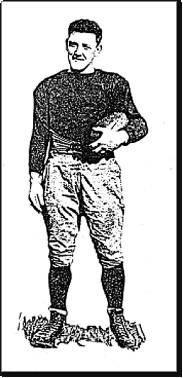
Sports: Football and Track & Field
Born: December 12, 1898
Died: November, 1964
Town: Newark, New Jersey
August George Desch was born December 12, 1898 in Newark, NJ. He attended St. Benedict’s Prep. Gus was swift, strong and agile. He excelled in track events and was a talented football player despite standing only 5’6” and weighing 135 pounds.
Gus was recruited to Notre Dame by Joe Byrne to run track for Knute Rockne, who was better known as the school’s football coach. In 1920, Gus qualified for the U.S. Olympic team in the 400 meter hurdles in Philadelphia. At the Olympic trials he finished third behind Frank Loomis and John Norton. In Belgium that summer, the results were identical, with America sweeping the medals and Gus taking home the bronze. Gus actually finished first in both of the qualifying heats.
In the spring of 1921, Gus won the 220-yard hurdles at the first NCAA Outdoor Track & Field Championships and the 440-yard hurdles at the AAU Championships. He set a new world record in the 440 of 53.8 seconds. Gus was one of five Notre Dame athletes to be named track and field All-Americans, as they finished second in the 1921 NCAA Championships. The Irish finished third in 1922. Gus held the distinction as Notre Dame’s only undergrad Olympian until 2004, when swimmer Crystal Bouvron competed for her native country of Singapore.
In the fall of 1921, Gus decided to go out for the football team. Coach Rockne had his doubts about his toughness, but gave him a uniform “to fool around with” and ordered the Irish veterans to rough him up. Gus survived, and proved to be an unstoppable open-field runner. That season, Notre Dame went 10–1 and Gus broke off at least one long run in every game. In a 48–0 win over Rutgers, for example, he had three carries for 125 yards. Among the superlatives used to describe his raw speed in the press were a “frightened deer” and a “scared bootlegger.”
Gus was looking forward to a big year in 1922, but ruined his ankle on the second play of the season. He tried to come back the following month but his quickness was gone and he decided to sit out his final season. He competed one more season for the track squad before graduating 1923.
Gus was an excellent writer, and was a leading member of the Notre Dame Daily newspaper. He went on to a distinguished career as a football and track coach, and wrote books on football strategy. He and his wife were very active in Catholic charities; in the 1950s she became president of the National Council of Catholic Women. The Desches lived in Philadelphia and then moved to the Chicago area after World War II. Gus died in Evanston, Illinois in November 1964.